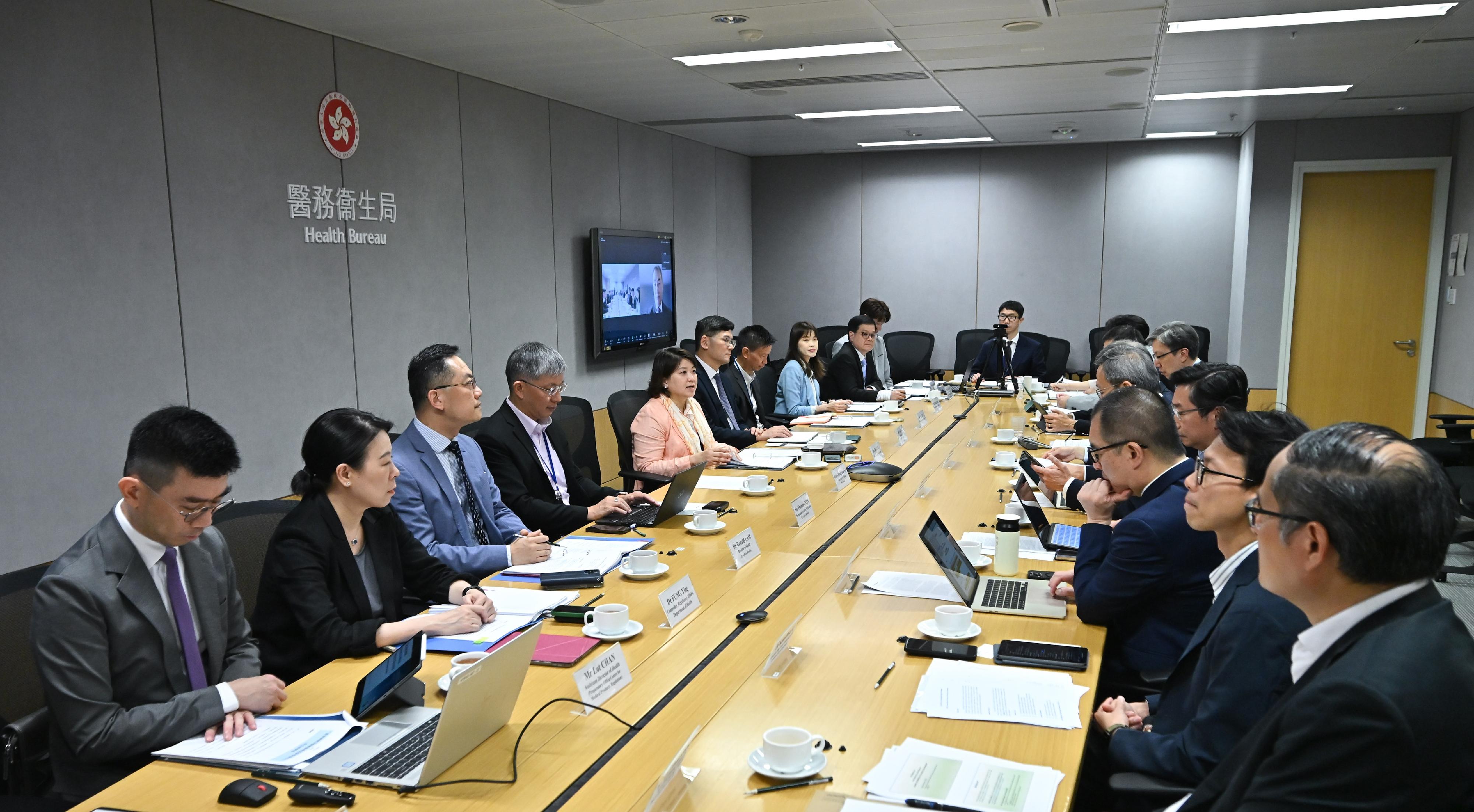Under Secretary for Health chairs third meeting of Steering Committee on Health and Medical Innovation Development (with photos)
******************************************************************************************
A representative of the Department of Health (DH) reported on the latest developments in establishing the CMPR, and the strategic preparatory work for its long-term development into an internationally recognised regulatory authority for drugs and medical products, including the process for becoming a regulatory member of the International Council for Harmonisation of Technical Requirements for Pharmaceuticals for Human Use, with a view to gaining international recognition for drugs approved by the CMPR. The DH also proposed that Hong Kong should adopt a phased approach in advancing the "primary evaluation" system for new drugs. The Government will put forward the timetable for the establishment of the CMPR and the roadmap towards the adoption of "primary evaluation" within this month.
At the meeting, members were also briefed on the proposals for establishing the RWSAC. The Government is seeking to establish the RWSAC by the end of this year. The Centre aims to enhance the access to and application of health and medical databases, and to foster collaboration between Hong Kong and the Mainland in relevant areas, particularly in integrating real-world data generated through the special measure of using Hong Kong-registered drugs and medical devices used in Hong Kong public hospitals in the Guangdong-Hong Kong-Macao Greater Bay Area (GBA), to achieve three major objectives: (1) to accelerate the research and development (R&D), approval and market launch of innovative medical products; (2) to promote the application of real-world data in support of evidence-based decision-making, thereby optimising treatment strategies and enhancing healthcare system efficiency; and (3) to develop Hong Kong into a leading region and global hub for real-world studies, with a view to attracting more international collaboration and investment.
In addition, members were briefed on the progress of the key initiatives undertaken by the Greater Bay Area International Clinical Trial Institute (GBAICTI). Officially established in the Hong Kong Park of the Hetao Shenzhen-Hong Kong Science and Technology Innovation Cooperation Zone in November last year, the GBAICTI has been actively advancing a number of clinical trial projects, including strengthening clinical trial collaboration with the two local medical schools, working jointly with the Greater Bay Area International Clinical Trials Center (BAY TRIAL) to promote the development of clinical trials and the biomedical industry, as well as establishing the GBA Clinical Trial Collaboration Platform with concerted efforts.
Members endorsed the above proposals and policy directions, and offered constructive comments. Dr Lee said, "I would like to express my heartfelt gratitude to the Steering Committee members for their invaluable insight to advise on the health and medical innovation development initiatives, and for recognising the direction of the Hong Kong Special Administrative Region (HKSAR) Government's work. The Policy Address has clearly stated the Government's commitment to developing Hong Kong into an international health and medical innovation hub. We are pressing ahead with the reform on the regulatory mechanism of drugs and medical devices, and to facilitate the translation and application of biomedical innovations. The timetable for the establishment of the CMPR and the roadmap towards the adoption of the "primary evaluation" will be announced shortly, along with the RWSAC which is targeted to be established by the end of this year, fully demonstrating our determination and operability to promote health and medical innovation. In addition, the co-ordinated development of the GBAICTI with BAY TRIAL in the Shenzhen Park under the 'one zone, two parks' model also marked a new chapter in cross-boundary collaboration.
"Hong Kong possesses the institutional advantages of 'one country, two systems' and professional strengths in the healthcare sector, providing unique conditions for advancing health and medical innovation. This strategic positioning is strongly supported by national policies, of which the 14th Five-Year Plan expressed clear support for Hong Kong's development into an international innovation and technology centre, while the Resolution of the Communist Party of China (CPC) Central Committee on Further Deepening Reform Comprehensively to Advance Chinese Modernization adopted by the Third Plenary Session of the 20th CPC Central Committee also pointed out the need of further reforming the medical and healthcare systems, and improving the mechanisms for supporting the development of innovative drugs and medical equipment. The HKSAR Government will leverage Hong Kong's unique advantages to expedite the provision of advanced diagnostic and treatment technologies to patients, and to promote co-ordinated development with other GBA cities, with the ultimate goal of bringing the benefits of good drugs and R&D to Hong Kong."
Established last year and chaired by the Secretary for Health, the Steering Committee on Health and Medical Innovation and Development comprises of members from relevant government bureaux and departments, institutions and local medical schools. The Steering Committee is responsible for co-ordinating and advancing work related to health and medical innovation, with a view to taking forward the policy of developing Hong Kong into an international health and medical innovation hub as set out in the Policy Address.
Ends/Thursday, June 12, 2025
Issued at HKT 17:40
Issued at HKT 17:40
NNNN





